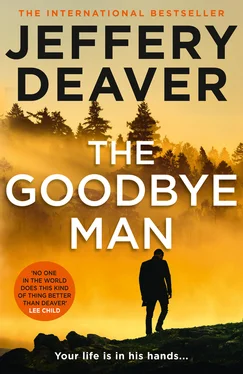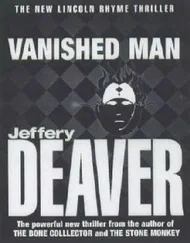Two pole lamps cast disks of homey light around the room, whose walls were papered with yellow and russet flowers, and whose floors were covered in dark green carpet, over which sat some Lowe’s or Home Depot oriental rugs. A nice home. Modest.
A brown uniform jacket sat on a coat rack near the door. It was thick and stained and had LARRY stitched on the breast. Shaw guessed the man was a mechanic.
They were doing their assessment of Shaw as well: the sport coat, the black jeans, the gray button-down shirt. Black slip-ons. This, or a variation, was his own uniform.
“Sit down, sir,” Larry said.
Shaw took a comfortable overstuffed armchair of bold red leather and the couple sat across from him. “Have you heard anything about Erick since we talked?”
“No, sir,” Emma Young told him.
“What’s the latest from the police?”
Larry said, “He and that other man, Adam. They’re still around the area. The detective, he thinks they’re scraping together money, borrowing it, maybe stealing it—”
“He wouldn’t,” said Emma.
“What the police said,” Larry explained. “I’m just telling him what they said.”
The mother swallowed. “He’s … never. I mean, I …” She began to cry—again. Her eyes had been dry but red and swollen when Shaw arrived.
He removed a notebook from his computer bag, as well as a Delta Titanio Galassia fountain pen, black with three orange rings toward the nib. Writing with the instrument was neither pretense nor luxury. Colter Shaw took voluminous notes during the course of his reward jobs; the pen meant less wear and tear on his writing hand. It also was simply a small pleasure to use.
He now wrote the date and the names of the couple. He looked up and asked for details about their son’s life: In college and working part-time. On summer break now. Lived at home.
“Does Erick have a history of being involved in neo-Nazi or any extremist groups?”
“My God, no,” Larry muttered as if exhausted by the familiar question.
“This is all just crazy,” said Emma. “He’s a good boy. Oh, he’s had a little trouble like everybody. Some drugs—I mean, after, well, after what happened, it’s understandable. Just tried ’em is all. The school called. No police. They were good about that.”
Larry grimaced. “Pierce County? The meth and drug capital of the state. You should read the stories in the paper. Forty percent of all the meth in Washington is produced here.”
Shaw nodded. “Was that what Erick did?”
“No, some of that Oxy stuff. Just for a while. He took antidepressants too. Still does.”
“You said, ‘after what happened.’ After what?”
They looked at each other. “We lost our younger boy sixteen months ago.”
“Drugs?”
Emma’s hand, resting on her thigh, closed into a fist, bundling the cloth below her fingers. “No. Was on his bike, run into by somebody who was drunk. My, it was hard. So hard. But it hit Erick in particular. It changed him. They were real close.”
Brothers, Shaw thought, understanding quite well the complex feelings the relationship generated.
Larry said, “But he wouldn’t do anything hurtful. Never anything bad. He never has. ’Cepting for the church.”
His wife snapped, “Which he didn’t do. You know he didn’t.”
Shaw said, “The witnesses said it was Adam did the shooting. I haven’t heard where the gun came from. Does Erick own one? Have access to one?”
“No.”
“So it would be his friend’s.”
Larry: “Friend? Adam wasn’t a friend. We never heard of him.”
Emma’s ruddy fingers twined the dress hem. A habit. “He’s the one did the cross thing too, burning it. And the graffiti. Everything! Adam kidnapped Erick. I’m sure that’s what happened. He had a gun and made Erick come with him. Hijack his car, rob him.”
“They took Adam’s truck, though, not Erick’s.”
“I was thinking about that,” the mother blurted. “Erick did the brave thing and threw his keys away.”
“He had his own bank account?”
The boy’s father said, “Yes.”
So they wouldn’t know about withdrawals. The police could get that information, what branches he’d been to. Probably already had.
“You know how much money he has? Enough to get very far?”
“Couple thousand, maybe.”
Shaw had been examining the room, observing mostly the pictures of the Youngs’ two boys. Erick was handsome with bushy brown hair and an easy smile. Shaw had also seen pictures of Adam Harper, posted as part of the reward announcement. There were no mug shots, though in both of the photos in the press he was looking into the camera with caution. The young man, whose crew cut was blond with blue highlights, was gaunt.
“I’m going to pursue this, try to find your son.”
Larry said, “Oh, sure. Please. You’re nothing like that big guy.”
“Didn’t like him one bit,” Emma muttered.
“Dalton Crowe?”
“That was his name. I told him to leave. I wasn’t going to pay him any reward. He laughed and said I could stuff it. He was going after the bigger one anyway, you know—the fifty thousand the county offered.”
“When was he here?”
“Couple days ago.”
In his notebook Shaw wrote, D.C. present at offerors’ house. June 9 .
“Now, let me tell you how I approach this. It won’t cost you anything unless I find Erick. No expenses. If I locate him, you’ll owe me that $900.”
Larry said proudly, “It’s $1,060 now. One of my cousins came through. Wish it was more but …”
“I know you’ll want me to bring him home to you. But that’s not my job. He’s a fugitive and I’d be breaking the law if I did that.”
“Aiding and abetting,” Emma said. “I watch all the crime shows.”
Colter Shaw tended not to smile but when meeting offerors, he occasionally did, to put them at ease. “I don’t apprehend. I deal in information, not citizen’s arrests. But if I can find him, I won’t let the police know where he is until there’s no chance he or anybody else’ll be hurt. You’ll need a lawyer. Do you know one?”
The regarded each other once more. “Fellow did our closing,” Larry said.
“No. A criminal lawyer. I’ll get you some names.”
“We don’t have … I mean, we could work out a home equity thing, I guess.”
“You’ll have to. He needs good representation.”
Shaw reviewed his notes so far. His handwriting was small and had once been described as balletic, it was so beautifully drawn. The notebook wasn’t ruled. Shaw didn’t need guidance. Each line was perfectly horizontal.
For another twenty minutes Shaw asked questions and the couple responded. Over the course of the interview, he noted that their adamant view that their son was innocent seemed objective; they simply could not accept that the son they knew had committed this crime. The idea bewildered them. The sole perp had to be Adam Harper.
When he felt he had enough information for the moment, he put away the pen and notebook, rose and walked to the door. The parents agreed to send any new information they heard from the police or friends or relatives Erick had contacted for money or other help.
“Thank you,” Emma said at the doorway, debating hugging him, it seemed. She did not.
It was the husband who was choking up. He fumbled whatever he was going to say and just gripped Shaw’s hand. Larry turned back to the house before the first tear appeared.
As he walked to the Winnebago, Shaw was reflecting on the one subject he had not mentioned to Emma and Larry: his policy not to accept a reward from family members if the search revealed that their missing loved one was dead. No reason to even bring up the possibility, even though it seemed more or less likely to Shaw that their second child had been murdered as soon as Adam found he had no more use for the boy.
Читать дальше












